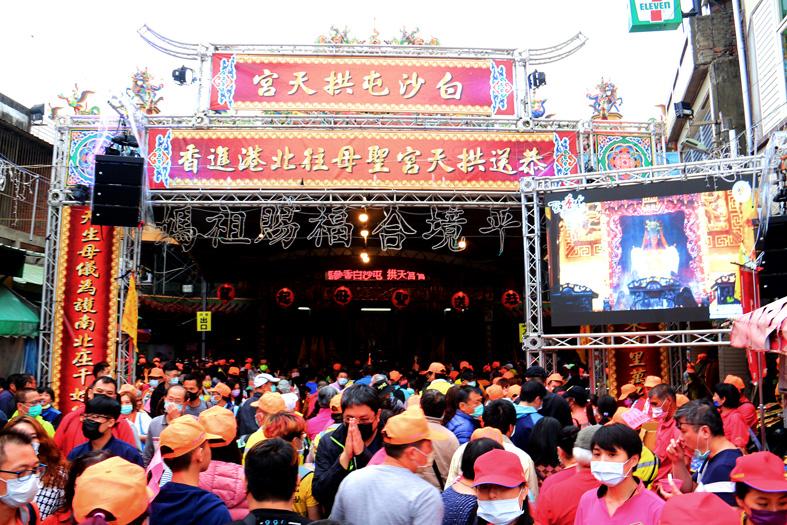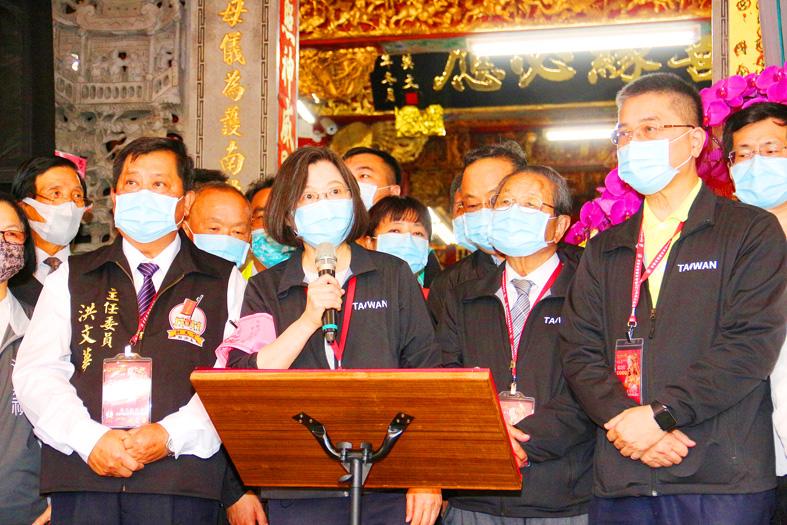The Baishatun Matsu Pilgrimage, one of the largest annual religious processions in Taiwan, was to set off from Miaoli County’s Baishatun (白沙屯) last night.
The procession of the sea goddess Matsu (媽祖) is being organized by the Gong Tian Temple (拱天宮).
President Tsai Ing-wen (蔡英文) visited the temple in the afternoon to dedicate a plaque and take part in a ritual to move the deities from their seats in the temple to prepare them for the procession.

Photo: CNA
Tsai said she prayed to Matsu to bring relief from the current water shortage.
She was accompanied by central and local government officials including Minister of the Interior Hsu Kuo-yung (徐國勇) and Miaoli County Commissioner Hsu Yao-chang (徐耀昌), as well as former minister of culture Cheng Li-chiun (鄭麗君).
About 78,000 people have signed up to participate in this year’s procession, which is to travel 400km to Chao Tian Temple (朝天宮) in Yunlin County’s Beigang (北港) and back.

Photo: CNA
A record 55,000 people participated in last year’s event, the organizers said.
Gong Tian Temple late on Thursday began pre-procession rituals by raising a banner to announce the start of this year’s pilgrimage. Worshipers have since flocked to the temple, bringing offerings of food and praying for a smooth journey.
The banner was to be carried at the front of the procession, which was scheduled to set off at 11:40pm yesterday.
The pilgrimage is officially recognized as the longest in Taiwan and is also known for its unplanned route, which is determined by the way in which Matsu’s palanquin moves or tilts during the procession.
Only the date of arrival at the Yunlin temple and the return date to Miaoli are fixed, having been decided by Matsu during a ritual held before the Lunar New Year.
Otherwise, the procession makes sudden turns and stops that are interpreted as reflecting the deity’s intentions, according to the Ministry of the Interior’s Web site on Taiwan’s religions.
This year, the procession is scheduled to arrive at the Chao Tian Temple on Friday, when a fire would be lit for worshipers to take back to the Gong Tian Temple.
The procession would begin the return journey on the same day to make it back to Miaoli by Monday next week, and a ritual using the fire would be held to “renew the divine spirit.”
In comparison, the 350km Dajia Matsu Pilgrimage from Taichung to Chiayi and back, which started on Friday, follows a list of temples where Matsu stops during the nine-day journey.
If the Baishantun Matsu Pilgrimage takes Provincial Highway No. 1 on its way south, it could meet up with the Dajia Matsu Pilgirmage in Yunlin on Wednesday, the organizers said.
Traffic control measures would be in place in Miaoli for the start of the procession, and the organizers said they have streamlined rituals for this year’s event amid COVID-19 restrictions.
Worshipers are urged to follow health authorities’ disease prevention guidelines, which includes not kneeling under the palanquin to seek the deity’s blessing, the organizers said.
Additional reporting by Tsai Cheng-min

Conflict with Taiwan could leave China with “massive economic disruption, catastrophic military losses, significant social unrest, and devastating sanctions,” a US think tank said in a report released on Monday. The German Marshall Fund released a report titled If China Attacks Taiwan: The Consequences for China of “Minor Conflict” and “Major War” Scenarios. The report details the “massive” economic, military, social and international costs to China in the event of a minor conflict or major war with Taiwan, estimating that the Chinese People’s Liberation Army (PLA) could sustain losses of more than half of its active-duty ground forces, including 100,000 troops. Understanding Chinese

The Ministry of Foreign Affairs (MOFA) yesterday said it is closely monitoring developments in Venezuela, and would continue to cooperate with democratic allies and work together for regional and global security, stability, and prosperity. The remarks came after the US on Saturday launched a series of airstrikes in Venezuela and kidnapped Venezuelan President Nicolas Maduro, who was later flown to New York along with his wife. The pair face US charges related to drug trafficking and alleged cooperation with gangs designated as terrorist organizations. Maduro has denied the allegations. The ministry said that it is closely monitoring the political and economic situation

‘SLICING METHOD’: In the event of a blockade, the China Coast Guard would intercept Taiwanese ships while its navy would seek to deter foreign intervention China’s military drills around Taiwan this week signaled potential strategies to cut the nation off from energy supplies and foreign military assistance, a US think tank report said. The Chinese People’s Liberation Army (PLA) conducted what it called “Justice Mission 2025” exercises from Monday to Tuesday in five maritime zones and airspace around Taiwan, calling them a warning to “Taiwanese independence” forces. In a report released on Wednesday, the Institute for the Study of War said the exercises effectively simulated blocking shipping routes to major port cities, including Kaohsiung, Keelung and Hualien. Taiwan would be highly vulnerable under such a blockade, because it

UNRELENTING: China attempted cyberattacks on Taiwan’s critical infrastructure 2.63 million times per day last year, up from 1.23 million in 2023, the NSB said China’s cyberarmy has long engaged in cyberattacks against Taiwan’s critical infrastructure, employing diverse and evolving tactics, the National Security Bureau (NSB) said yesterday, adding that cyberattacks on critical energy infrastructure last year increased 10-fold compared with the previous year. The NSB yesterday released a report titled Analysis on China’s Cyber Threats to Taiwan’s Critical Infrastructure in 2025, outlining the number of cyberattacks, major tactics and hacker groups. Taiwan’s national intelligence community identified a large number of cybersecurity incidents last year, the bureau said in a statement. China’s cyberarmy last year launched an average of 2.63 million intrusion attempts per day targeting Taiwan’s critical